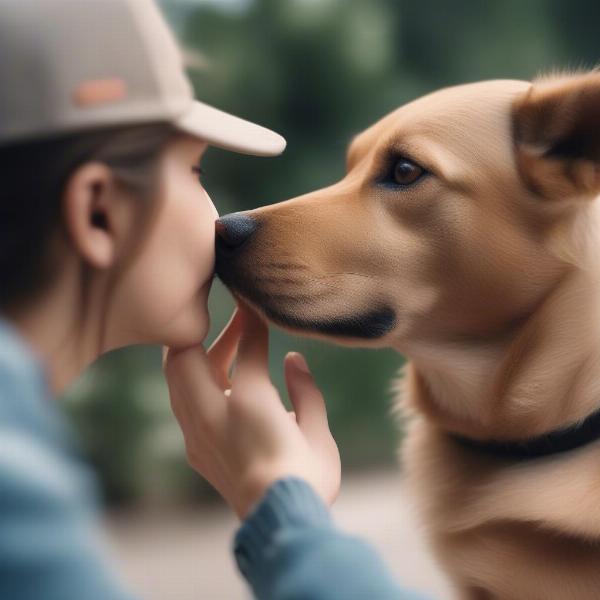Dogs lick for various reasons, and while some licking is normal and even healthy, other instances might indicate underlying issues. Understanding why your dog licks can help you better address their needs and ensure their well-being. Whether it’s a quick lick to the hand or persistent licking of objects, we’ll explore the different motivations behind dog licking.
Decoding the Lick: Common Reasons for Dog Licking
Licking is a natural behavior for dogs, ingrained from puppyhood. Mother dogs lick their puppies to clean them, stimulate elimination, and provide comfort. As dogs grow, licking can serve several purposes, including communication, hygiene, exploration, and even as a sign of stress.
Affection and Bonding
Often, a dog’s lick is a simple expression of affection. Just like humans hug or kiss, dogs may lick to show they care. This type of licking is often directed towards their owners or other dogs in their social group.
Attention-Seeking Behavior
Sometimes, dogs lick to get your attention. If your dog is feeling bored or ignored, they might resort to licking your hand, feet, or even the furniture to get you to notice them.
Anxiety or Stress
Excessive licking, especially of themselves, paws, or objects, can be a sign of anxiety or stress. This behavior, known as acral lick dermatitis, can become compulsive and lead to skin infections or hair loss. Identifying and addressing the underlying stressor is crucial.
Taste and Exploration
Dogs explore the world through their senses, and taste is a significant part of that. They might lick objects or surfaces simply because they’re curious about the taste or smell. This is especially common in puppies.
Medical Reasons
In some cases, licking can be a symptom of an underlying medical condition. Allergies, skin irritations, pain, or even neurological issues can cause a dog to lick excessively. If you notice a sudden increase in licking or if the licking seems focused on a particular area, consult a veterinarian.
Habit
Just like any behavior, licking can become a habit. Even if the initial reason for the licking is resolved, the dog may continue the behavior out of habit.
 Dog licking owner's hand as a sign of affection
Dog licking owner's hand as a sign of affection
Addressing Excessive Licking: Tips and Strategies
If your dog’s licking is becoming problematic, there are steps you can take to address it.
- Identify the trigger: Observe your dog’s behavior and try to pinpoint what triggers the licking. Is it a specific situation, time of day, or object?
- Reduce stress: If anxiety is the cause, create a calm and predictable environment for your dog. Provide plenty of exercise, mental stimulation, and consider using calming aids like pheromone diffusers.
- Redirect the behavior: When you catch your dog licking excessively, redirect their attention to a more appropriate activity, such as playing with a toy or practicing a command.
- Consult a veterinarian: If the licking persists or seems related to a medical issue, seek professional veterinary advice.
Understanding Dog Licking: A Key to a Stronger Bond
By understanding the various reasons behind dog licking, you can better interpret your dog’s behavior and address their needs. Whether it’s a loving lick or a sign of discomfort, paying attention to this simple act can strengthen the bond between you and your furry companion.
FAQs
-
Why does my dog lick my feet? Dogs might lick your feet for a variety of reasons, including affection, attention-seeking, or simply because they like the salty taste.
-
Is it unhealthy for my dog to lick my face? While dog saliva isn’t inherently harmful, it can carry bacteria. It’s generally best to avoid letting your dog lick your face, especially around your mouth and eyes.
-
How can I stop my dog from licking furniture? Try to identify the underlying reason for the licking. If it’s anxiety-related, address the stressor. You can also try using bitter sprays on furniture to deter licking.
-
My dog is constantly licking his paws. What should I do? Excessive paw licking can be a sign of allergies, irritation, or anxiety. Consult your veterinarian to rule out any medical issues.
-
Is it normal for dogs to lick themselves? Some self-licking is normal for grooming purposes. However, excessive licking, especially in one area, can indicate a problem.
About ILM Dog
ILM Dog (ilmdog.com) is your trusted international resource for comprehensive dog care and upbringing. We offer expert guidance on everything from breed selection and training to health, nutrition, and grooming. Whether you’re a seasoned dog owner or just starting your journey, ILM Dog provides practical advice and valuable resources to help you give your canine companion the best possible care. Contact us for personalized support: Email: [email protected], Phone: +44 20-3965-8624.